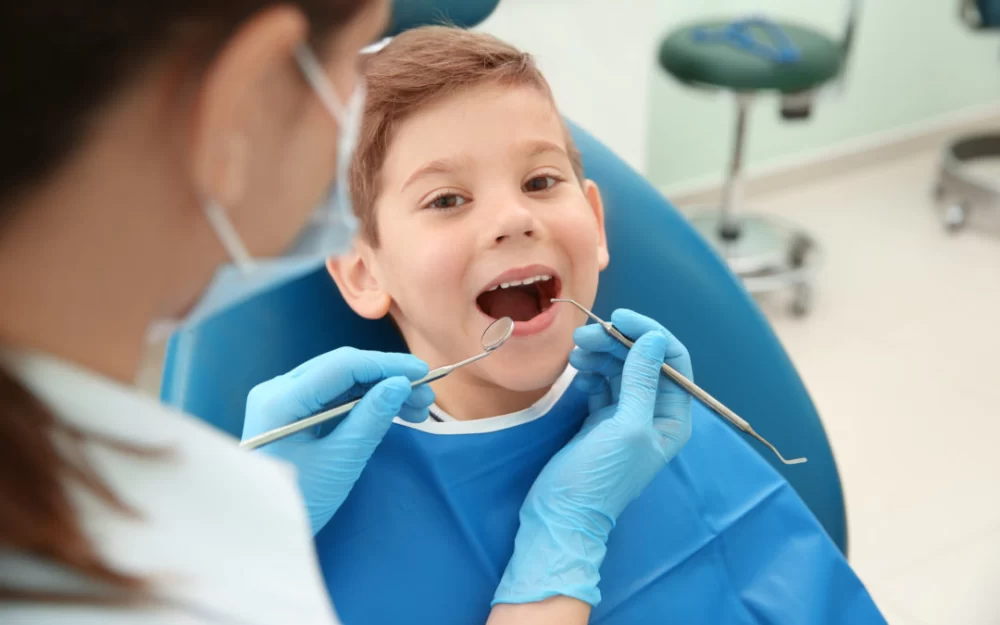
Finding a Pediatric Dentist Who Truly Cares for Your Child's Dental Health
When it comes to your child’s health, finding the right dentist is one of the most important decisions you can make. As a parent, I know how vital it is to ensure your child feels comfortable and cared for in a dental setting. Pediatric dentistry is a specialized field that caters specifically to children, offering a different approach to treatment than general dentistry. If you’re wondering how to find a dentist who specializes in children's care, you’ve come to the right place! Let me walk you through the steps of finding the perfect pediatric dentist for your little one.
1. Why Choosing a Pediatric Dentist Matters
Choosing a dentist who specializes in children's care is crucial for several reasons. Pediatric dentists have the specific training and experience to treat children with empathy and understanding. They focus not only on the child's dental health but also on making the experience as comfortable and stress-free as possible. Pediatric dentistry also involves techniques and approaches that cater to younger mouths, which are still developing.
As I learned from a recent experience with my own child, it’s not just about making sure the dentist is capable of treating teeth; it’s also about making sure they can ease any fears a child might have. I remember the first visit to a pediatric dentist; my child was terrified. But the dentist’s gentle approach and kid-friendly environment made all the difference. My little one even looked forward to the next visit! That’s the kind of care you want to look for in a pediatric dentist.
2. How to Search for a Pediatric Dentist Near You
Finding the right pediatric dentist can sometimes feel overwhelming, especially if you’re a first-time parent or new to the area. But with a few key strategies, you can find a trustworthy and caring pediatric dentist for your child.
Here are some methods to consider:
- Word of Mouth: One of the best ways to find a reliable pediatric dentist is through recommendations from friends, family, or even your pediatrician. A personal referral helps ensure you are choosing someone who others have had positive experiences with.
- Online Reviews: Websites like Google, Yelp, and even social media platforms often have reviews from other parents. These reviews can provide insight into the dentist’s approach, office environment, and how children feel about the experience.
- Professional Associations: The American Academy of Pediatric Dentistry (AAPD) is a reputable source for finding qualified pediatric dentists. Their website allows you to search for certified pediatric dentists in your area.
- Insurance Listings: If you have dental insurance, your provider can give you a list of in-network pediatric dentists. This is a convenient way to narrow down your options without worrying about costs.
3. What to Look for in a Pediatric Dentist
Not all pediatric dentists are the same, so it's important to look for specific qualities that align with your child's needs. Here are a few things to keep in mind when evaluating potential dentists:
- Experience and Training: Pediatric dentists have additional training beyond dental school, focusing specifically on child development and dentistry. Make sure the dentist is board-certified and has experience treating children of your child’s age group.
- Office Environment: A child-friendly office can make a huge difference in your child’s comfort. Look for an office with bright colors, toys, and staff who are experienced in working with kids. The environment should feel welcoming and not intimidating.
- Gentleness and Communication Skills: A great pediatric dentist will be patient and able to communicate effectively with children. They should be able to explain procedures in a way that makes sense to kids without overwhelming them. Your dentist should also be able to address your concerns as a parent.
- Availability and Accessibility: You should also consider the location and office hours. Is the dentist easily accessible in case of emergencies? Do they offer flexible appointment scheduling? These factors can be very important when you need dental care for your child.
4. Preparing Your Child for Their First Dental Visit
The first dental visit can be an emotional experience for both the child and the parent. It’s important to prepare your child in a positive and reassuring way. Here are a few tips from my own experience that helped ease the nerves:
- Talk Positively: Avoid using words like “shot” or “pain” when discussing the dentist. Instead, focus on the exciting parts, like the “magic chair” or the opportunity to pick out a fun sticker afterward.
- Read Books: There are many children’s books that talk about visiting the dentist. These can be a great way to familiarize your child with the process before the actual visit.
- Role Play: Pretend to be the dentist at home, letting your child be the dentist or patient. This can help them feel more in control and comfortable when it’s time for the real appointment.
5. What to Expect at Your Child’s First Appointment
During your child’s first dental visit, the dentist will likely perform a gentle examination of your child's teeth and gums. The goal is to check for any potential issues and to make sure everything is developing as expected. Depending on your child’s age, the dentist may also apply a fluoride treatment or provide you with guidance on brushing and flossing at home.
In my experience, the dentist took extra time to explain everything to my child in a way that was clear and fun, making the visit feel more like an adventure than a chore. The staff even gave my child a balloon afterward, which helped reinforce the positive experience.
6. Common Questions About Pediatric Dentistry
If you’re still unsure about pediatric dentistry, you’re not alone. Many parents have questions about what to expect. Here are some common ones I had when I first started looking for a pediatric dentist:
- When should my child first visit the dentist? The American Academy of Pediatric Dentistry recommends a child’s first dental visit should occur by their first birthday or within six months after their first tooth erupts.
- How often should my child see the dentist? Just like adults, children should visit the dentist regularly, usually every six months. This helps prevent cavities and ensures their teeth are growing properly.
- Is dental sedation safe for children? Dental sedation is safe when administered by a qualified pediatric dentist. If your child needs extensive work done or is especially anxious, sedation may be an option to make the experience more comfortable.
Finding the right dentist who specializes in children's care can make a world of difference in your child’s dental journey. Whether you're looking for a compassionate provider or need a practice that makes visits fun and stress-free, there are plenty of options available. Start your search today and ensure your child’s smile stays healthy for years to come!







 Encore Dental of Toms River - An Affiliate of The Smilist4.0 (562 review)
Encore Dental of Toms River - An Affiliate of The Smilist4.0 (562 review) Complete Health Dentistry of Woodland Hills4.0 (335 review)
Complete Health Dentistry of Woodland Hills4.0 (335 review) Aspen Dental - Canton, GA4.0 (573 review)
Aspen Dental - Canton, GA4.0 (573 review) Vision Dental Montana4.0 (97 review)
Vision Dental Montana4.0 (97 review) Main Line Dental Aesthetics4.0 (336 review)
Main Line Dental Aesthetics4.0 (336 review) 24 Hour Dentist3.0 (450 review)
24 Hour Dentist3.0 (450 review) The Importance of Oral Health Education During Pregnancy for a Healthy Pregnancy
The Importance of Oral Health Education During Pregnancy for a Healthy Pregnancy Best Tips for Brushing Your Teeth Properly for Healthy Gums: Essential Techniques for Oral Health
Best Tips for Brushing Your Teeth Properly for Healthy Gums: Essential Techniques for Oral Health Why Skipping Dental Checkups Can Lead to Bigger Oral Health Problems
Why Skipping Dental Checkups Can Lead to Bigger Oral Health Problems Advantages of Porcelain Dental Restorations
Advantages of Porcelain Dental Restorations How Can Diabetes Cause Tooth and Gum Problems? Preventing and Managing Oral Health Issues
How Can Diabetes Cause Tooth and Gum Problems? Preventing and Managing Oral Health Issues Healthy Habits for Promoting Good Oral Health and Hygiene: Tips for a Healthy Smile
Healthy Habits for Promoting Good Oral Health and Hygiene: Tips for a Healthy Smile